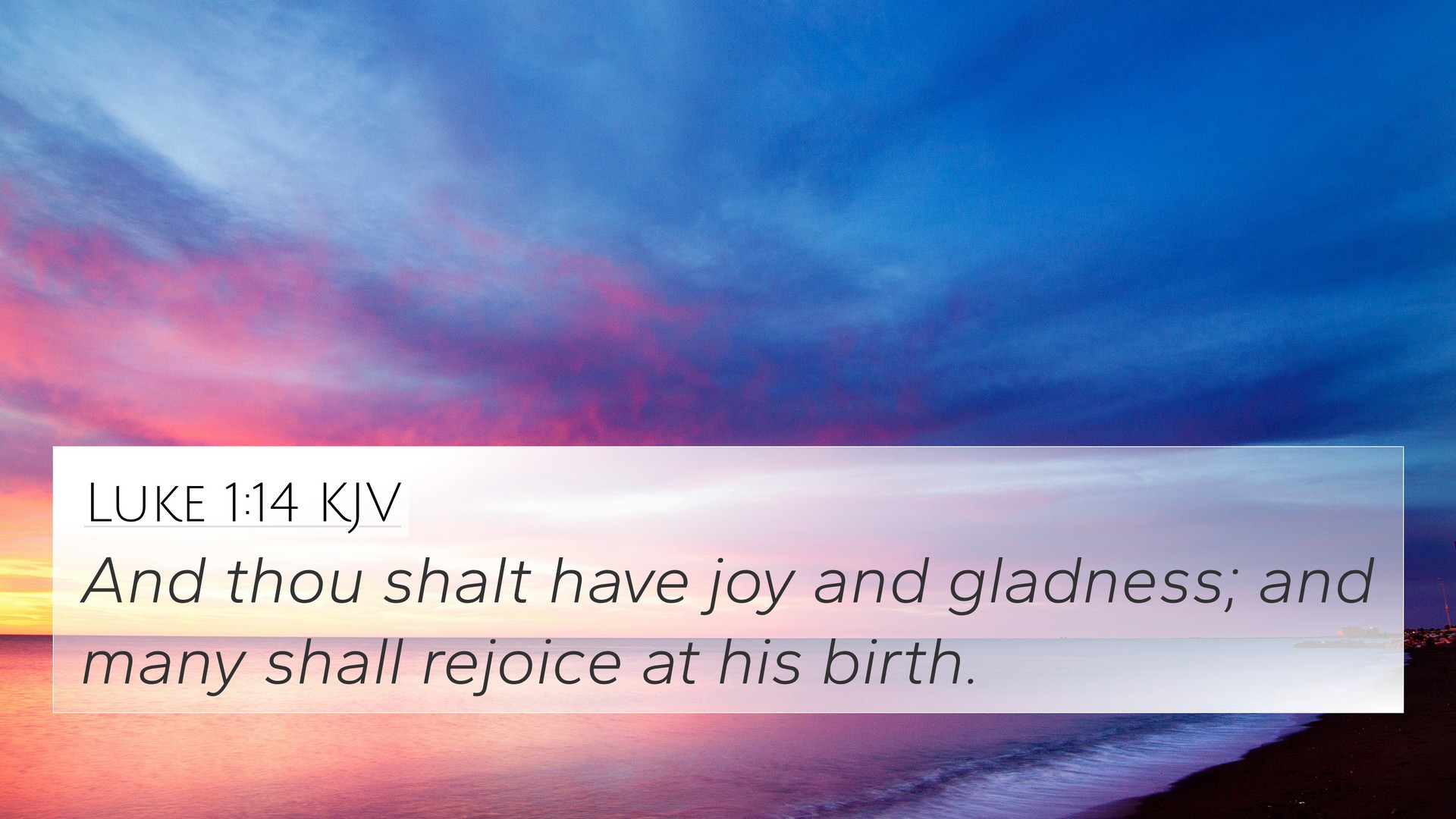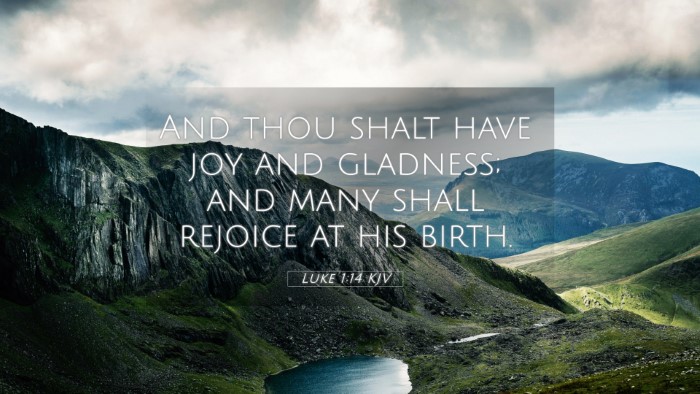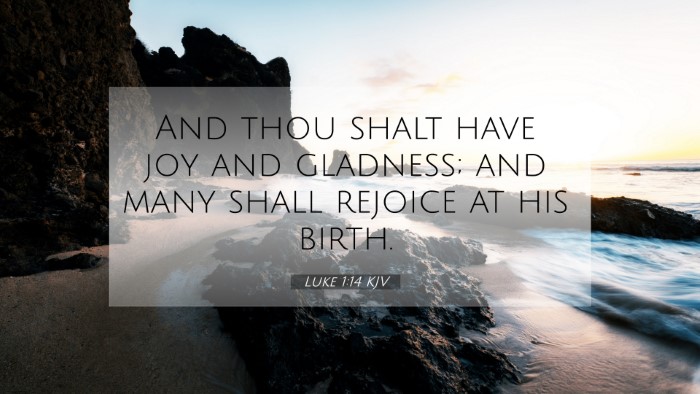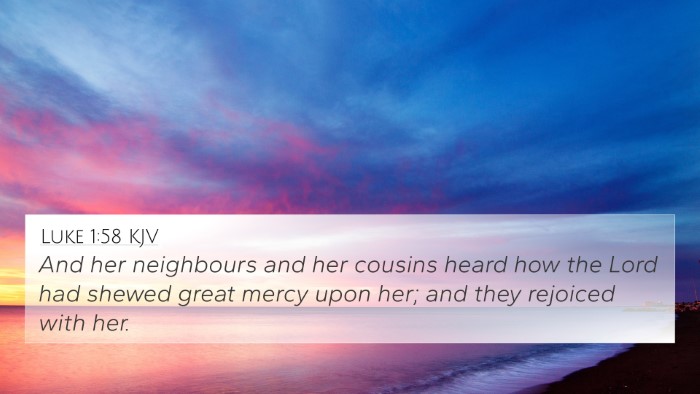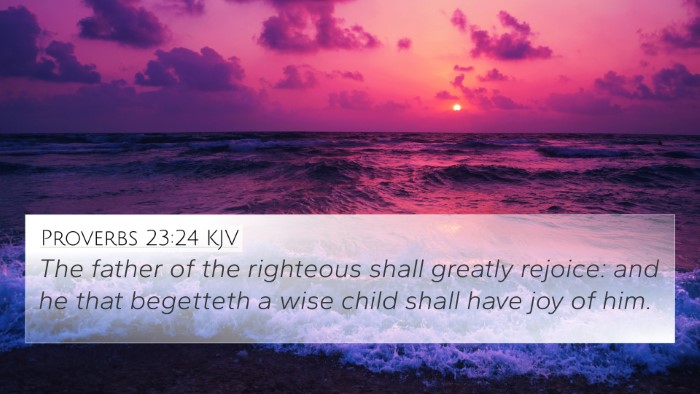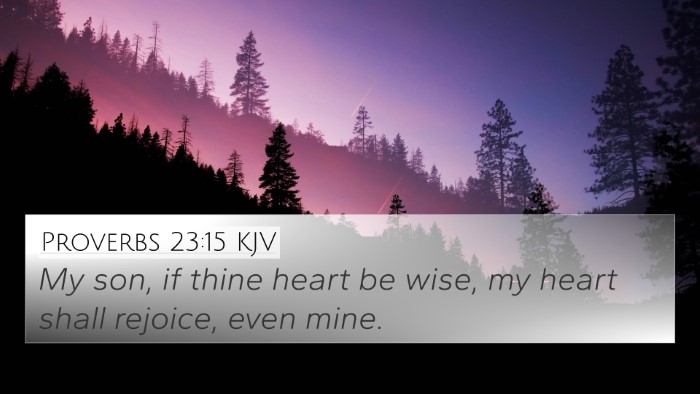Bible Verse Meaning: Luke 1:14
Luke 1:14 states: "And thou shalt have joy and gladness; and many shall rejoice at his birth." This verse is significant as it encapsulates the profound joy that accompanies the announcement of John the Baptist's birth, a pivotal moment in the biblical narrative. The verse conveys the themes of anticipation, joy, and the fulfillment of God's promises.
Interpretation and Summary
The surrounding context presents the miraculous announcement made to Zechariah, John's father, by the angel Gabriel. This is significant in several ways:
- Joy and Gladness: The joy promised in this verse signifies the emotional and spiritual upliftment that John's birth would bring not only to his family but to many, indicating his future role and influence.
- Prophetic Fulfillment: This birth was prophesied, aligning with multiple Old Testament predictions. The connections between Bible verses are essential for understanding the significance of this moment in salvation history.
- Community Impact: The joy of John's birth extends beyond personal joy to communal rejoicing, highlighting the interconnectedness of individual and collective experiences of God’s blessings.
Cross-References
To fully grasp the implications of Luke 1:14, we note several Bible verses that relate to its themes:
- Isaiah 40:3: "The voice of him that crieth in the wilderness, Prepare ye the way of the Lord..." – This Old Testament prophecy refers to John’s role in heralding the coming Messiah.
- Matthew 11:11: "Verily I say unto you, Among them that are born of women there hath not risen a greater than John the Baptist..." – Here, Jesus affirms the significant role John plays in salvation history.
- Luke 1:42: "And she spake out with a loud voice, and said, Blessed art thou among women..." – This verse highlights the joy and blessing surrounding Elizabeth's pregnancy and foreshadows the joy John's birth will bring.
- John 1:6-7: "There was a man sent from God, whose name was John. The same came for a witness..." – John's purpose as a witness of the light connects to the joy of his birth.
- Luke 2:10: "And the angel said unto them, Fear not: for, behold, I bring you good tidings of great joy..." – A parallel expression of joy tied to significant births, including that of Jesus.
- Philippians 4:4: "Rejoice in the Lord always: and again I say, Rejoice." – This verse reinforces the theme of joy in the Christian faith, rooted in God’s promises.
- Matthew 2:10: "When they saw the star, they rejoiced with exceeding great joy." – The joy of recognizing God's guidance shares a thematic connection with joy at John's birth.
Theological Reflections
Several key theological points arise from Luke 1:14:
- God's Plan: John’s birth is steeped in divine purpose, showcasing God’s orchestrating hand from the very beginning, as discussed in Isaiah 9:6 about the Messiah.
- Response to God’s Visitations: Joy is the natural response to God's intervention in human history, a theme echoed throughout scripture, such as Psalm 126:3.
- Inter-Biblical Dialogue: Understanding Luke 1:14 through the lens of other scriptures provides insight into the continuity of God’s redemptive saga, thus affirming the importance of cross-referencing Biblical texts.
Application for Believers
The joyful proclamation and the significance of John’s life call believers to reflect on the promises that God has for them. The implications of this verse encourage:
- Celebration of Spiritual Birth: Just as John's birth brought joy, so should the spiritual birth and transformation of individuals bring joy to the community.
- Anticipation of God’s Goodness: Followers of Christ are reminded of the joy that accompanies living in God’s purpose.
- Encouragement in Prayer: Zechariah's prayer was answered with great joy—reminding believers of the power of prayer and God’s faithfulness.
Conclusion
In summary, Luke 1:14 is a profound declaration of joy that extends beyond one individual and invites an entire community into celebration. By employing tools for Bible cross-referencing, believers can deepen their understanding of this momentous occasion and reflect on its significant implications for their lives. Through recognizing the thematic connections between Bible verses and cross-referencing these texts, readers can glean a richer understanding of God’s joy-filled narrative.
